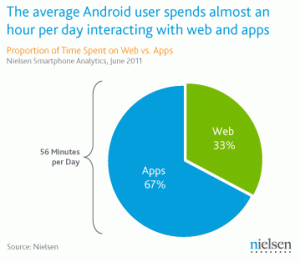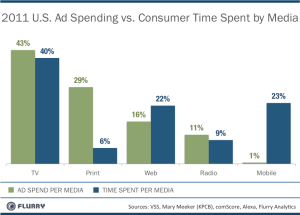5 Ways Mobile Is Different (And How That Matters)
A few weeks ago, the head of competition for the European Union, Joaquin Almunia, reportedly instructed Google that the search giant must make “sweeping changes” to its business model by extending restrictions the Europeans are insisting upon for Web search into the mobile realm. (See EU Orders Google to Change Mobile Services | Reuters.)
Is he possibly for real? We all know mobile is growing by leaps and bounds, powering political revolutions, connecting the developing world to the new information economy, and disrupting legacy industries. That market dynamism should instead counsel for a restrained approach, delaying government intervention until at least some of the dust settles, because mobile is different. Here’s why — and how that matters.
1. Apps Rule Mobile, Not Web Search
With more than 300,000 mobile applications released in the last year alone, “apps are increasingly replacing browsers as the method of choice for connected consumers to find and use information.”  This striking user preference is neither difficult to discern nor hard to understand. One can see it walking on nearly any downtown street as teenagers query Foursquare and Facebook apps for friend check-ins, businessmen find lunch spots with OpenTable or Yelp, and 20-somethings search for trending hashtag topics inside Twitter’s app. In other words, in the mobile realm apps rule.
This striking user preference is neither difficult to discern nor hard to understand. One can see it walking on nearly any downtown street as teenagers query Foursquare and Facebook apps for friend check-ins, businessmen find lunch spots with OpenTable or Yelp, and 20-somethings search for trending hashtag topics inside Twitter’s app. In other words, in the mobile realm apps rule.
Wired’s editor-in-chief Chris Anderson in 2010, along with Square’s COO Keith Rabois in 2011, both predicted flatly that the Web is dying and mobile devices with dedicated apps are to blame. Apple’s Steve Jobs (watch his keynote) said it a bit more provocatively:
On a mobile device, search hasn’t happened. Search is not where it’s at. People aren’t searching on a mobile device like they do on the desktop. What is happening is they are spending all of their time in apps.
The numbers now prove that all three of these pundits were correct. As much as 50% of mobile search is happening in apps today. In March, a remarkably small 18.5% of all smartphone and tablet usage was in the browser; the rest was through apps. Nearly half of smartphone owners today shop using mobile apps. The international wireless association GSMA reported as far back as 2011 that second only to texting (and even more than actual calls), native apps comprise the highest level of smartphone activity. Yelp’s CEO Jeremy Stoppelman told Wall Street on August 2 that a majority of weekend searches now come in through its mobile app and that “by choosing the Yelp app people are bypassing search engines and consequently their engagement is higher.” Even venerable Craigslist is today battling mobile apps.
So mobile Web search is either dead or dying. That’s in part, as explained in the next bullet, because mobile users need, want and expect immediate answers, not a listing of URLs for browsing. Blue links just do not cut it anymore when users are mobile.
2. Search Is Local, Targeted and Interactive For Mobile Users
CNN Mobile’s VP Louis Gump, a mobile legend, says that every business must “start with the assumption that mobile is different.” Reflecting that difference, mobile sites typically include only the most crucial and time- and location-specific functions and features, while desktop Web sites contain a wide range of content and information. The reason is that mobile users are looking for local, immediate and interactive information.
Consider these stats —
-
Somewhere from 40% to 53% of all mobile searches are local. Coupled with GPS location detection, mobile users employ their devices to navigate and explore the world around them. Coffee anyone?
-
70% of mobile search-based transactions are completed (from query to check-out) in an hour or less. People on mobile devices are often looking for information and assistance to support buying decisions as they literally move toward the point of sale.
-
Led by Apple’s Siri, and a consequence of ever-smaller devices, voice is powering the new generation of mobile user interfaces (UIs). Like Marty Scorcese in his New York City taxi, mobile users need iterative search results that are just too slow to type anymore.
Our “information needs and habits” are different on mobile, reports TechCrunch, where users want “smaller bits of information quicker, usually calibrated to location.” The end result is a relationship between device owner and information which is far more personal, immediate and reciprocal in the mobile environment than on the desktop. Marketers know this and are working feverishly to engage their audiences using these new selling points. Mobile marketing is “immediate, personal and targeted to specific consumer groups” says Twitter marketing rockstar Shelly Kramer.
3. Voice As the Mobile UI Is a Game Changer
Along with everything from in-car services like Ford’s Microsoft-powered Sync and even TV remote controls, mobile UIs are evolving rapidly to offer the consistency that made the graphical UI (GUI) so important in evolution of the desktop PC. But in the mobile environment, voice is becoming the always-available common denominator as the size of devices and the desire (and legal need) for hands-free use limit the effectiveness even of touchscreens.
Using market leader Apple as our example again, as Frank Reed commented in Marketing Pilgrim,
Siri is definitely a form of search. It’s a request and answer mechanism that can do tasks outside of search (texts, emails, etc.) but when a user asks it for the closest Italian restaurant it is, in essence, a search engine. It is presenting what its backend calculations have decided are the best possible answers for the question asked by the iPhone user. Sounds exactly like Google’s function as a search engine, doesn’t it? Different delivery of a result set but it’s search.
Android users have a similar capability with Google Now, which has been called “more than just a new voice search application for Android; it’s also an indication of how Google will overhaul the user interface for its search products.” Consumers will soon see this same sort of voice interaction in mobile apps (powered by Nuance and others), on Windows phones and from well-funded voice search venture AskZiggy.
Voice is “the most revolutionary user interface in the history of technology,” according to Forbes. And it is all about search: search on steroids that is. As far as Google, the Mountain View company countered with a just-announced voice search app for the Apple iOS and interactive search results on its mobile Web properties. Whether Google can recapture the inventiveness in voice and mobile search that allowed its Web algorithms to dominate is open to serious question. Right now it’s rather desperately playing catch-up.
4. No One Has Yet Figured Out How To Monetize Mobile
Look closely at that graphic. Notice the dramatic difference between advertising spending and usage rates on mobile platforms compared to other media? That’s because no one has really figured out yet how to monetize mobile services. Social media darling Facebook — illustrated painfully by its revenue and stock price stumbles — for years has stood as the dominant supplier of display ads on the Web, but has just barely tried to introduce advertising into its mobile app. Considering that in May total usage of Facebook mobile surpassed that of its classic website for the first time and the clear lesson is that profiting from mobile information is a difficult endeavor, lagging well behind most technology markets.
Other than wireless network carriers, that is. As The Economist explains:
The [mobile] combination of personalisation, location and a willingness to pay makes all kinds of new business models possible….. Would-be providers of mobile Internet services cannot simply set up their servers and wait for the money to roll in, however, because the network operators — who know who and where the users are and control the billing system — hold all the cards.
This is not the place to discuss data caps and shared wireless plans, but the fact is that few if any mobile Internet services except those employing a pay-per-subscriber model have even come close to monetizing the mobile experience. That will and must change, although when and how remain unclear. As BusinessWeek notes, “desktop Internet use led to the rise of Google, eBay and Yahoo, but the mobile winners are still emerging.”
5. Mobile FIRST Is The New Reality
Ten, five or even two years ago, developers all talked about the need to adapt content to fit the smaller form factor, screen real estate and touch navigation features of mobile devices. That’s already ancient history today. The new reality is that everyone from television and media companies to PC manufacturers are thinking “mobile first,” designing interfaces (gesture-based and voice-powered), content (shorter, punchier and more micro blog-like) and interactivity (social media integration, video clip streams, etc.) to cater to an audience that is dominantly mobile, most of the time.
The title of Luke Wroblewski’s new book Mobile First says it all. In a mobile world, all we thought we had learned about the Web is reversed and upside down. Mobile starts from scratch and leads everything else.
So how do these profound differences matter? This author (and my Project DisCo colleague Dan O’Connor) has previously written about the difficulties of “market definition” in search, a big term for the simple idea that display ads, text ads and organic search results are all competing for the same customers. If the Federal Trade Commission (FTC), which is still “investigating” Google for alleged search monopolization two years on, took this into account, its lawyers would scuttle any government prosecution because Google’s market share would be well below that of search alone, hardly in monopoly territory.
Earlier DisCo commented about the European Union’s penchant for regulating nascent products and industries before they even exist. By moving against Google in mobile Web search, the EU is instead trying to regulate a market that is dying and all but irrelevant to the realities of today’s mobile Internet usage and experience. With news just days ago that Americans spend more time watching their smartphones than watching television, the reality is that the mobile market may have already hit an important inflection point. In the name of protecting the future, however, Europeans are living in the past.
The FTC should pay attention. Mobile is different and poised to surpass fixed Internet usage. Whatever “gatekeeper” functions Google plays on desktop PCs (which we think is a huge overstatement), it is plainly not the same in the mobile realm. Let’s free the competitive battles to flourish in mobile search before government steps in with its thumb on the scale. In a mobile world, everything is different; those differences need to and should be reflected in antitrust enforcement policies.









